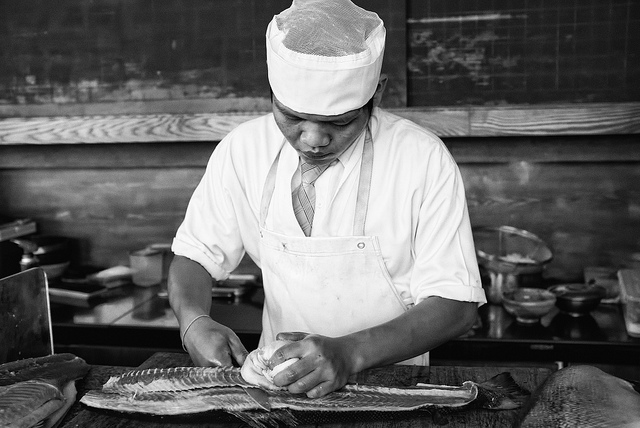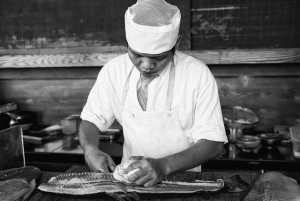I dream about sushi,
and dream happily of eating it!
Recalling the first time I ate sushi, I could never guess then how much I would come to like it, and even crave for it, eventually.
And it can be expensive too! What a treat it can be.
I got to watch the movie “Jiro Dreams Of Sushi” It’s about Jiro Ono, sushi chef and master, who owns the sushi restaurant Sukiyabashi Jiro, located in the trendy urban location of Ginza in Tokyo.
From what I gather from the movie, he’s more than 80 years old, and for a large, large part of those years, he has been making sushi.
All the way from the basics, to what is traditionally done, to constantly finding new ways to improve, to ultimately, give an even better, or the best possible, experience to his customers and guests.
His claim to fame? His restaurant has been awarded three Michelin Stars, from the Michelin guide, which is a veritable “best of the best” of restaurants around the globe.
Three stars is also the highest ranking, meaning “exceptional cuisine.” It’s the equivalent of “It’s worth flying into the country just to eat at his restaurant.”
And from the movie’s statement of 30,000 yen starting price tag of a meal, it’s certainly not cheap.
Not bad for a small restaurant with around 10 counter seats. Reservations are made months in advance.
And Jiro Ono? Goes to work everyday, rarely misses being at the shop, and still dreams about sushi.
Commitment to constant improvement
Jiro didn’t go to school or start at the top. He started by apprenticing, and by learning the trade from his master. Sushi chefs go through a long time of apprenticeship to perfect their craft, and all the intricacies and little details that come along with this cuisine.
I’ve tried to make sushi before. Let me tell you it’s hard. It can be a challenge to prepare, put together, and get it looking like what you order at a restaurant. It’s no easy feat.
Even after putting up his own shop, Jiro still continued to look for ways to enhance the experience of his customers. He did it by constantly looking for the best ingredients, looking for better and better ways to prepare and present those ingredients, and constantly keeping his skills sharp and training others as well.
There was even a part about how instead of massaging an octopus for only 25 minutes, he found that massaging an octopus for 40 minutes would make it easier to eat, and would give his guests a more enjoyable time eating octopus at his restaurant.
It’s so easy to rest on laurels. He could have easily taken vacations, trained others, or let others run his shop. But he’s always looking for ways to improve.
It’s harder to keep massaging octopus longer, but it’s what gets better results.
Learn skills, keep polishing them, and keep creating
Jiro, and even both of his sons, would not have gotten to the level that they are right now, if they hadn’t taken the time to learn the basics, improve, and keep on doing.
The basics of cooking rice, preparing fish, even the first task of squeezing a hot towel for the guest, are all so important to producing a great experience for the customer.
That’s also why the apprentices spend a lot of time doing these tasks, that over time, the skills not only become second nature, but it’s easier for them to produce and experiment, and still come up with a great product and experience.
And these skills have to be constantly practiced, lest they become dull. Sure, there are things you never really forget how to do, but if you are to reach the top and produce at a consistently high level, then you’ve got to keep practicing.
It’s not only about getting to the top. It’s also about staying there.
Passion and enjoyment in what you do
There was a scene that Jiro shared:
“I’d dream about sushi. I’d dream about making it. I wanted to come up with something better always.”
It was very clear Jiro loved what he was doing, and he loved entertaining and surprising his guests with what he had to offer to them.
This passion and enjoyment seen in how they work, and how much they seek to produce great quality, and for everyone else, to gain the approval from Jiro. It’s also seen in the meticulous attention to detail.
They taste all of the ingredients bought and prepared before their service. If it doesn’t taste good, they won’t serve it. They pay attention to the cleanliness of the place, and their food. They plan and memorize seating arrangements for their guests beforehand, all so they can deliver the best service and experience.
It was about them declaring to the world: “This is what I want to do all my life.”
“You have no home to come back to.”
At an early age, Jiro left the care of his father, and then later his mother. As an apprentice under a sushi chef, he had to stand for himself. There was no easy way out, no parachute. If he failed, it will hit him hard.
Jiro’s sons shared that when their father and mother got married, they only had 10 yen in the bank, and Jiro was earning just enough as a sushi chef’s apprentice.
Failure was not an option.
And that’s necessary to achieve mastery. You’ve got to get and go into it full. You can’t just do it for a week, expect to get really good, and then move on to the next thing.
You would not have developed the skills necessary for success.
More than that, you would not have developed the necessary attitude and mindset for success.
Dabblers don’t make it to the big leagues, only those with commitment, passion, and dedication do.
In between beginning and success, are periods that looks like failure.
Don’t stop.
Maybe in the middle of all that apprenticeship and training, Jiro might have thought to himself to stop and quit. Maybe he felt uncertainty that he would ever reach success. That he would ever get out of being an apprentice.
One of his apprentices shared that all he did for several years was cook rice, and clean fish. Only after 10 years of hard work and practice did that apprentice start to make the tamagoyaki, or egg sushi to be served.
That’s a lot of time needed to master the skills necessary to start even being really useful inside the kitchen, and it doesn’t stop there.
It can be too easy for us to abandon our efforts in reaching for our goals and dreams. It also much, much easier for us to procrastinate.
And you’ll never get back that day.
You’ll never get to success without going through that period. That’s what separates the winners from the quitters.
Don’t Stop.
Keep on dreaming, and living.
Jiro kept moving forward, letting his dream nourish him and provide him with motivation and gumption to go ahead, get better, and just soldier on and on.
He kept his dream alive by really going for it. His dream kept him alive by giving him a place to focus on and go to.
Nourish your biggest dreams, and in turn, let it nourish you as well.
Be kind and giving to each other. It’s your dream.
It’s your life.
At the very least,
work on mastering “getting better.”


Leave a Reply